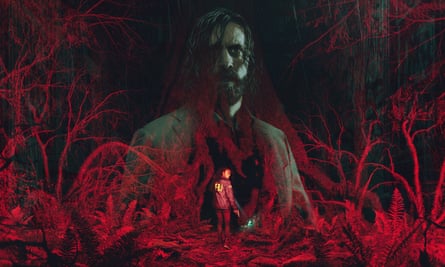On Petri Alanko’s website, where the Bafta-nominated Finnish musician offers his services as a composer for video games and film, the artist and performer makes a bold claim: “No deadlines missed since 1990”. If you’re a creative of any flavour, you’re likely to read that with a mixture of awe, suspicion and incredulity. Deadlines are flexible, right? Right?
“It’s not a boast, it’s a service promise, more or less,” laughs Alanko. “I’m really good at scheduling my own work, but I am very careful when dealing with someone else for the first time. Not all clients know exactly what they want, despite me helping them to figure out what’s needed. I need to be the creative, the analyst, as well as the crisis negotiator.” Video game music production is often chaotic: composers have to be malleable, lean, adaptable, unafraid of killing their darlings or working to impossibly tight deadlines. That Alanko shrugs this off as simply part of the job is testament to his dedication.
Alanko is fairly unconventional in his methods. His latest project, Alan Wake 2, was 13 years in the making, the follow-up to a 2010 cult hit that developer Remedy had been trying to make for three console generations. The plot follows the eponymous protagonist and FBI agent Saga Anderson in a twisting helix narrative that phases between reality and a supernatural otherworld, as the boundaries between fact and fiction bleed (sometimes literally – it’s not shy about gore).
An aural mimic of Wake’s mental breakdown … Alan Wake 2. Photograph: Remedy EntertainmentBut what does that sound like? For Alanko, it was dropping pianos off forklift trucks, laying into the ivory keys with sex toys, fiddling with a custom-built “apprehension engine” and playing with a “demonic” instrument called the Mega Marvin (“a giant cowbell with rods and springs”). Remedy gave the composer room to experiment, and the results are easily on par with what you’d hear in arthouse cinephile hits that might run rampant at Cannes or Sundance, a perfect blend of disquieting and intelligible.
To get across the vibe of the Dark Place, Alan Wake 2’s hostile otherworld, Alanko tested and recorded the way instruments sounded when left to ring, or when compressed or dampened. He experimented with feedback, with recording sounds above the range of human hearing and bringing them within range to see how messed up it sounded. He played with the inharmonic, with screeching, he pushed woodwind and brass to their limits within the matrices of high-end recording software. “Eventually some of Remedy’s basement wonders were brought in, too,” he says. “They happened to have a lot of very interesting instruments down there, namely the Mega Marvin and the Apprehension Engine.”
The Apprehension Engine is one effed-up thing to master, or even to playPetri Alanko
The Apprehension Engine – made famous in unsettling films such as The Witch and The Lighthouse – was once called “the most terrifying instrument ever made” by Brian Eno. Stephen King had a visceral reaction to hearing it in action for the first time (which is very fitting, when you realise how closely Remedy’s “new weird” games tread to King’s oeuvre), but for Alanko, it was the key to the mysterious, hostile ambience that Alan Wake 2 needed to conjure in its Dark Place.
“I can tell you it’s one effed-up thing to master, or even to play,” smiles Alanko when I ask him about the curious instrument. “Imagine the most horrific things in any instrument, all put into one, and its sole purpose is to make noises. Sometimes the noises have some tonal content, sometimes they don’t, and usually it seems it has its own mind to do whatever it wants to. People say you’re an OK player if you’ve put 10,000 hours into practising an instrument. With Apprehension Engine, you’re not even close. You begin with a total void and stay in it for a long time. It has a spring reverb tank, metallic rods that resonate or tick-tock-tick-tock, two string instrument necks, several strings, a nyckelharpa crank, an e-bow, active mics, a heavily distorting preamp … all in one.”
‘A marvellous nightmare’ … the Apprehension Engine, left, and the Mega Marvin. Photograph: Joel Horhonen/RemedyIt’s a “marvellous nightmare”, in short, and “about as Alan Wake 2 as you can get”. It simply oozes horror. Balancing uneasily on the barrier between familiar and hellish, the Apprehension Engine effortlessly summoned everything Alanko needed for Remedy’s game – this sense of a contorted reality that’s snatched a writer away from the real world and into a fever dream of his own making, a limbo that threatens to spill over into the real world.
Aurally mimicking Wake’s mental breakdown was important to Alanko. The character is something of a chimera of Alanko, lead writer Sam Lake, principal writer Clay Murphy, and director Kyle Murphy, sharing more similarities to them all than “we are willing to, or possibly can admit to”. To empathise with Alan, to capture the sonic experience of his descent into (and out of) madness, was vital.
“How I perceive writing music to the blackest of emotions or mental states in Alan Wake 2 is related to my early adulthood experiences and occasional personal trouble,” Alanko says. “Luckily, my experiences are due to environment and the prevailing conditions only, and not, say, substance usage.” But earthquakes can still kill, nevertheless. Being able to write for a character suffering from a flaking mental state demands a very empathic person.
Alanko’s dedication to his craft is evidenced in his full sleeve tattoo of another Remedy game he scored, Control. He tells me he already has ideas, drafts and concepts for what an Alan Wake 3 might sound like. “I’m in this as long as my heart beats,” he says. “The music matters to me so much.”
∎

